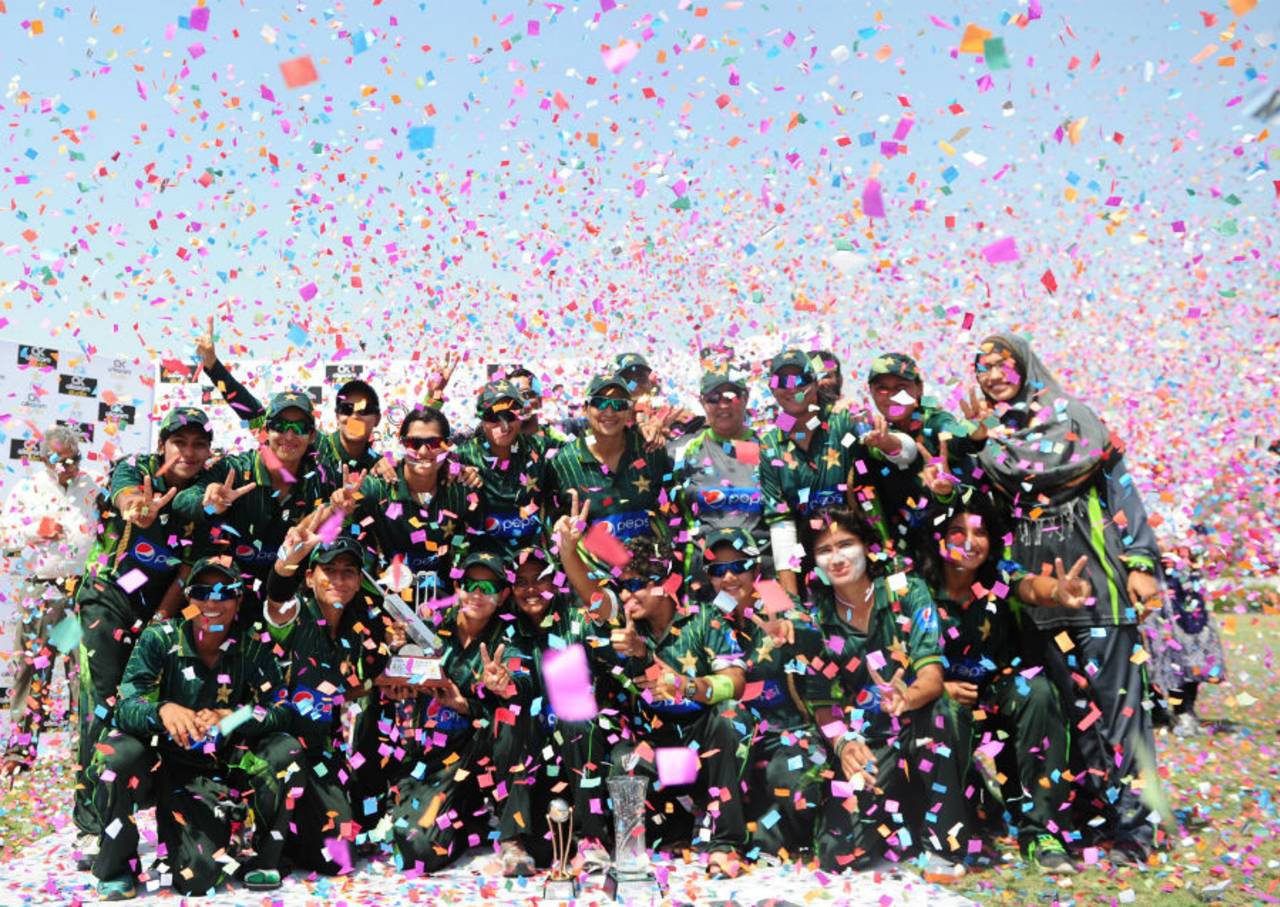'Well prepared' Pakistan Women seek to build on potential
Pakistan will be looking to overcome recent distractions regarding their participation, and convert promise into performance at the Women's World T20
Shashank Kishore
Mar 16, 2016, 7:06 AM

Nineteen women were awarded contracts after Pakistan secured the gold medal in the Asian Games in Guanzhou in 2010 • AFP
Pakistan Women managed to do in their first attempt what their male counterparts haven't been able to ten previous attempts: beat India at a global event. They achieved the feat in 2012 in Sri Lanka, defending a modest 98 to record their first-ever win at the Women's World T20.
The PCB also managed to do in 2011, what even bigger boards like Australia and England did much later. Nineteen top cricketers were awarded central contracts in a bid to promote the game following their Asian Games gold medal winning performance in Guangzhou. So there is enough to suggest potential, even though it hasn't always translated into performances.
This time around, Sana Mir and her side have a tougher challenge if they are to seek a repeat of their 2012 heroics, and progress past the group stages. The biggest hindrance, though, is match practice. They last played a series against West Indies in November, and have had to mostly rely on training camps back home to gear up for the tournament.
While most of the other sides arrived in India a week early to prepare, Pakistan were caught in a political crossfire over security. It was only after assurances from the Indian government, did the PCB send their men's and women's team for the tournament. While the men sneaked in a warm-up game, the women had to make do with just one net session ahead of their tournament opener against West Indies, three-time semi-finalists at the Women's World T20, in Chennai.
The situation isn't something Pakistan is unfamiliar with. Simmering political tension meant their matches at the 2013 Women's World Cup had to be shifted out of Mumbai. Further protests and heightened security forced the team to be restricted to the Barabati Stadium in Cuttack, where they were lodged.
Mir, who is one of the more recognisable faces of women's cricket in Pakistan, agreed an air of uncertainty wasn't ideal, but insisted the team did whatever they could to gear up for the tournament. "Things have been difficult in the past too, from when I took over in 2009. Then from 2010 to 2012, we didn't play a single international game," she explained. "Things like that come in your way as a player, and it can get tough to stay motivated. You don't get an idea of how much you need to improve as a player, but the support we have received from friends, family and support staff has been brilliant.
"When you are a leader of the team, you have to ensure you focus on the job when there are other things happening around you. Everyone expects you to manage it. That is why we are professionals. This is what you sign up for when you want to wear the jersey for the country. On the days when we were waiting for our go-ahead, we arranged matches against Under-19 boys in Karachi. We had day-night games; three of our games are under lights here, so we are well prepared."
Mir also formally announced her decision to step down as captain after the tournament, to culminate a journey that lasted seven years, but was quick to state she was doing so only because it was important to groom a younger captain leading into their next global event. "I've been honoured to have captained Pakistan for this long, but now the time is right for the next captain to come and settle in," she said. "We are two years away from the next World T20 and the Asian Games, where we would defend our gold medal. That's the trend I would like to set in our country.
"It's important that the leadership passes on smoothly. I'll continue as a player and will be there for the team till they need me. Mahela Jayawardene and Kumar Sangakkara have shown that you can continue to play even after your time as captain; they have been wonderful ambassadors. Alex Blackwell has done that too for Australia. I will be available as a player."
Mir also said that the game has helped ease the challenges faced by sports persons, particularly women in Pakistan. From receiving threats for playing a sport that was considered "male-dominated," the country has come a long way towards embracing a culture that allows women to fit in to the system.
"A lot has changed, but a lot more needs to be done," Mir said. "This team has managed to change perceptions. There were difficult times for women cricketers in Pakistan. Now parents often come up to me and tell me they would like to see their daughters become like one of us. That is the impact these girls have had on the country and society. I see cricket as a medium for women empowerment in Pakistan. Because of the success of the women's cricket team, other teams like badminton, football, squash - they are all being supported by the media and public. We recently had a mountaineer who climbed Mount Everest. It's wonderful that cricket has done a lot of good for women in Pakistan."
Shashank Kishore is a senior sub-editor at ESPNcricinfo